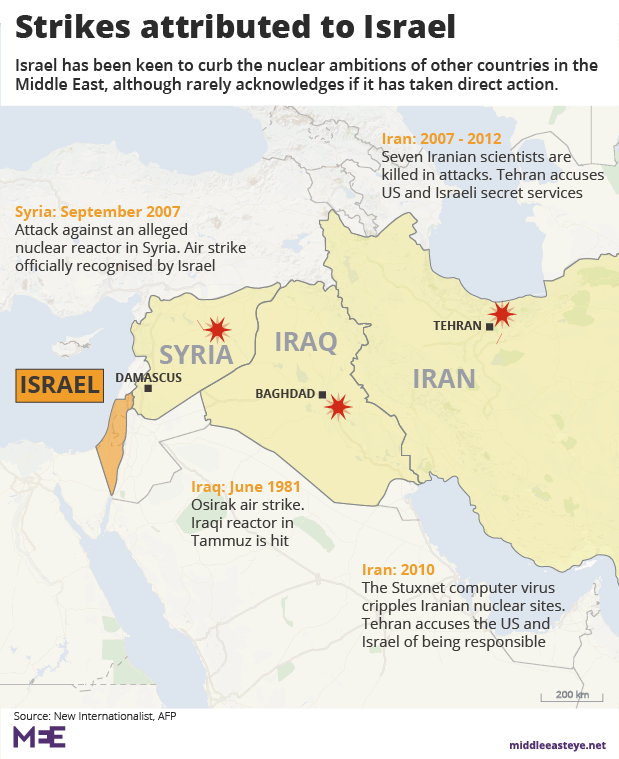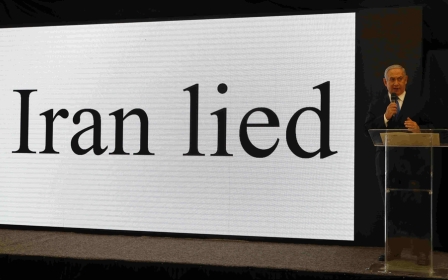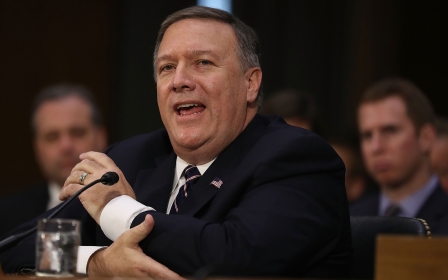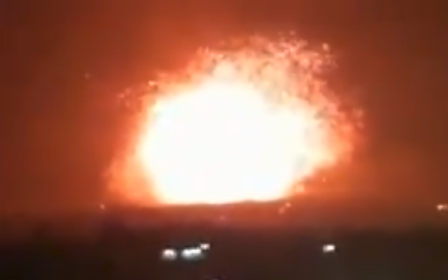'A dog and pony show': Netanyahu mocked for Iran nuclear deal claims
Benjamin Netanyahu's flamboyant presentation on Monday was billed as an expose of groundbreaking intelligence "the world has never seen before", which proved Iran had lied about its nuclear programme and would do so again.
According to diplomats and analysts, it had all been seen before and dealt with.
Netanyahu made his claims against a backdrop of shimmering CDs and rows of files representing a Mossad intelligence haul - but what they contained had already been examined by the world's nuclear watchdog, and dated from before the 2015 deal signed by Iran to curtail its activities.
The evidence did not show that Iran had broken that deal. It did show what was already known - Iran had misled the world in the early part of the 21st century.
Questioned in an interview on CNN on Tuesday, Netanyahu skirted a question on whether there was any proof of new violations by Iran, instead focusing on "new information that we didn't know that shows how advanced they were in their bomb-making work".
The White House responded enthusiastically to Netanyahu's speech but then had to correct a statement saying Iran "has tried" to hide its nuclear activity, changing it to "had tried" to reflect that the allegations were old.
Iran's foreign minister, Javad Zarif, mocked Netanyahu, calling him “the boy who cried wolf".
“Pres. Trump is jumping on a rehash of old allegations already dealt with by the IAEA to 'nix' the deal. How convenient,” tweeted Zarif.
Netanyahu's speech came as Donald Trump edges towards withdrawing from the Joint Comprehensive Plan of Action, or JCPOA, the deal Iran signed with world powers in 2015 to limit its nuclear activity.
Ofer Zalzberg, an Israeli analyst for think-tank Crisis Group, told Middle East Eye that Netanyahu was trying to reach the American public to increase pressure on Trump to withdraw.
"This was an attempt to further incentivise the US president to withdraw from the JCPOA and not to go for weak fixes to the agreement," he said, suggesting Netanyahu was worried about Trump agreeing to European suggestions that the agreement could be altered.
"This [speech] substantiates things that people in the know were familiar with for quite some time. It's not dramatic in any way and certainly there is nothing with respect to whether Iran violated the agreement."
He said the theatrical nature of Netanyahu's speech had also raised questions with Israeli officials, who were worried it might backfire with European officials who are more supportive of the nuclear deal.
Arms control expert Jeffrey Lewis, from the Middlebury Institute of International Studies, tweeted that Netanyahu's claims about Iran developing nuclear weapons designs and equipment needed to make weapons were covered in a 2015 report by the International Atomic Energy Agency.
"Let's go through Netanyahu's dog-and-pony show. As you will see, everything he said was already known to the IAEA and published in IAEA GOV/2015/68 (2015). There is literally nothing new here and nothing that changes the wisdom of the JCPOA," he wrote.
The IAEA on Tuesday declined to directly address Netanyahu's accusations that Iran was breaching its landmark nuclear deal with major powers. "In line with standard IAEA practice, the IAEA evaluates all safeguards-relevant information available to it," a spokesman said. "However, it is not the practice of the IAEA to publicly discuss issues related to any such information."
Netanyahu has continued to insist on the value of the documents Israeli intelligence reportedly smuggled from a warehouse in Tehran, announcing that he was speaking to the leaders of Russia, France, Germany, the UK and China.
He said Iran had lied about a secret weapons programme, Project Amad, when claiming its nuclear activities were completely peaceful.
Returning from a trip to the Middle East where he met with Netanyahu, Mike Pompeo, the new US secretary of state, said he had viewed the documents himself.
Lies, damned lies, and Netanyahu
"This makes very clear that, at the very least, the Iranians have continued to lie to their own people," said Pompeo.
Trump has called the nuclear accord the worst deal ever negotiated, and threatened to reimpose US penalties unless Britain, France and Germany can fix its "flaws". The deal lifted economic sanctions on Iran in return for curbing its nuclear programme.
This makes very clear that, at the very least, the Iranians have continued to lie to their own people
- Mike Pompeo, US secretary of state
Most world powers, however, say the nuclear deal is working as intended for now and is the best way to keep Iran from acquiring a nuclear arsenal.
Netanyahu's speech comes shortly after missile attacks on Syrian government-held air bases reportedly struck several arms depots in Hama and the Aleppo countryside, including some holding surface-to-surface missiles that Iran was preparing to deploy.
According to a monitor, the missile strikes killed 26 pro-Syrian government fighters, a majority of them Iranian.
Unidentified Iranian officials called reports of Iranian casualties in the attacks "baseless", while the Israeli military said soon after the latest bombing raids that it did not comment on foreign reports.
However, the attacks, whose origins have yet to be confirmed, came after Israel bombed the T4 airbase in Syria in February and days after the Israeli defence minister, Avigdor Lieberman, said Israel would attack Iranian assets in Syria if they were deemed a threat.Damascus and Tehran also accused Israel on 9 April of conducting deadly strikes against a military base in central Syria.
New MEE newsletter: Jerusalem Dispatch
Sign up to get the latest insights and analysis on Israel-Palestine, alongside Turkey Unpacked and other MEE newsletters
Middle East Eye delivers independent and unrivalled coverage and analysis of the Middle East, North Africa and beyond. To learn more about republishing this content and the associated fees, please fill out this form. More about MEE can be found here.





